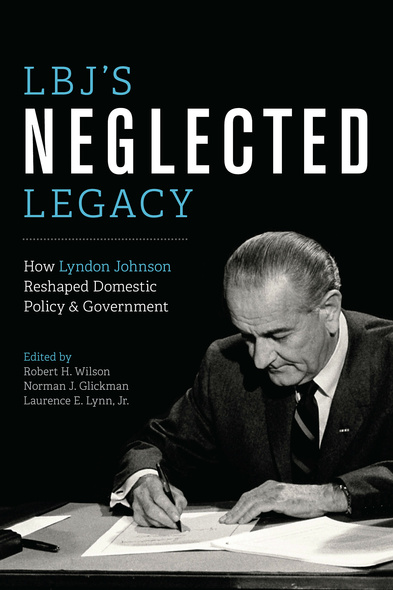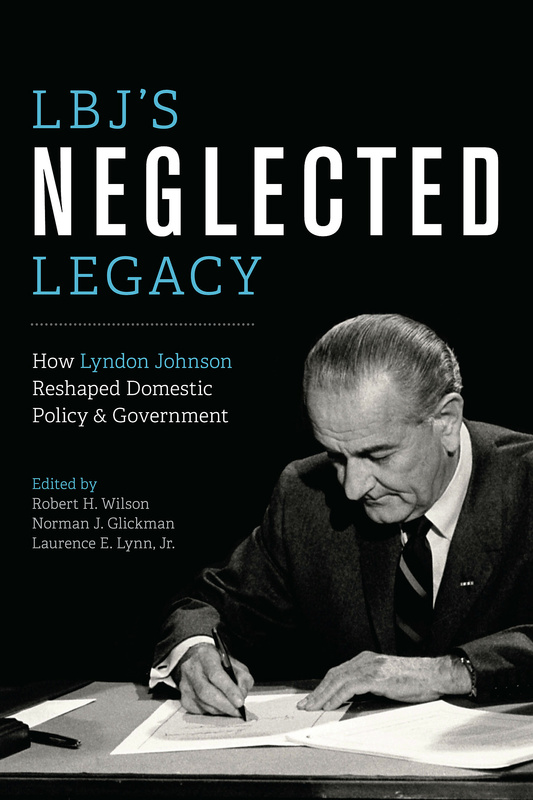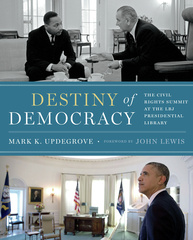LBJ's Neglected Legacy
How Lyndon Johnson Reshaped Domestic Policy and Government
During the five full years of his presidency (1964–1968), Lyndon Johnson initiated a breathtaking array of domestic policies and programs, including such landmarks as the Civil Rights Act, Head Start, Food Stamps, Medicare and Medicaid, the Immigration Reform Act, the Water Quality Act, the Voting Rights Act, Social Security reform, and Fair Housing. These and other “Great Society” programs reformed the federal government, reshaped intergovernmental relations, extended the federal government’s role into new public policy arenas, and redefined federally protected rights of individuals to engage in the public sphere. Indeed, to a remarkable but largely unnoticed degree,Johnson’s domestic agenda continues to shape and influence current debates on major issues such as immigration, health care, higher education funding, voting rights, and clean water, even though many of his specific policies and programs have been modified or, in some cases, dismantled since his presidency.
LBJ’s Neglected Legacy examines the domestic policy achievements of one of America’s most effective, albeit controversial, leaders. Leading contributors from the fields of history, public administration, economics, environmental engineering, sociology, and urban planning examine twelve of LBJ’s key domestic accomplishments in the areas of citizenship and immigration, social and economic policy, science and technology, and public management. Their findings illustrate the enduring legacy of Johnson’s determination and skill in taking advantage of overwhelming political support in the early years of his presidency to push through an extremely ambitious and innovative legislative agenda, and emphasize the extraordinary range and extent of LBJ’s influence on American public policy and administration.
LBJ's Neglected Legacy . . . offers considerable insight into how the Great Society has endured despite fundamentally changed public expectations of—and confidence in—the federal government.
…provides a unique approach to evaluating the Johnson administration’s work.
An important compendium of current scholarship on the successes and limitations of the most monumental domestic program in U.S. history.
One of the Great Society’s key legacies is that it has not disappeared but has become intertwined in what it means to exert governmental power in the modern United States. For serious students of modern U.S. governance, public policy, and politics, this book should be an invaluable resource.
Norman J. Glickman was Distinguished University Professor of Public Policy and Urban Planning at Rutgers University. He formerly served as the Director of Rutgers Center for Urban Policy Research.
Laurence E. Lynn, Jr., is the Sydney Stein, Jr., Professor of Public Management Emeritus at the University of Chicago. He served as Deputy Assistant Secretary of Defense during the Johnson presidency.
List of Tables
List of Figures
Preface
Part I. Reconsidering LBJ's Domestic Policies
Chapter 1. Understanding Lyndon Johnson's Neglected Legacies (Norman J. Glickman, Laurence E. Lynn Jr., and Robert H. Wilson)
Chapter 2. Remembering LBJ: One Historian's Thoughts on Johnson's Place in the Pantheon of Presidents (Robert Dallek)
Part II. Defining Citizenship and Immigration
Chapter 3. Ending Jim Crow, Attacking Ghetto Walls (Gary Orfield )
Chapter 4. Expansion and Contraction in LBJ's Voting Rights Legacy (Jorge Chapa)
Chapter 5. An Unexpected Legacy: The Positive Consequences of LBJ's Immigration Policy Reforms (Frank D. Bean, Susan K. Brown, and Esther Castillo)
Part III. Education, Health, and Social Welfare Policy
Chapter 6. Head Start: Growing beyond the War on Poverty (Elizabeth Rose)
Chapter 7. Lyndon Johnson and American Education (Gary Orfield)
Chapter 8. The Health Care Legacy of the Great Society (Paul Starr)
Chapter 9. LBJ's Legacy in Contemporary Social Welfare Policy: Have We Come Full Circle? (Cynthia Osborne)
Part IV. Cities, the Environment, and Science Policy
Chapter 10. Lyndon Johnson and the Cities (Norman J. Glickman and Robert H. Wilson)
Chapter 11. The Past and Future of the Johnson Administration's Water Quality Policies (David J. Eaton)
Chapter 12. LBJ, Science, Technology Policy, and Lessons for the Future (Gary Chapman)
Part V. Improving Public Management
Chapter 13. Reform of the Federal Government: Lessons for Change Agents (Laurence E. Lynn Jr.)
Chapter 14. Constructing Effectiveness: The Emergence of the Evaluation Research Industry (Peter Frumkin and Kimberly Francis)
Part VI. Conclusions
Chapter 15. Fifty Years Later: Legacies and Lessons of LBJ's Domestic Policies (Laurence E. Lynn, Jr., Norman J. Glickman, and Robert H. Wilson)
Acknowledgments
Contributors
Index











